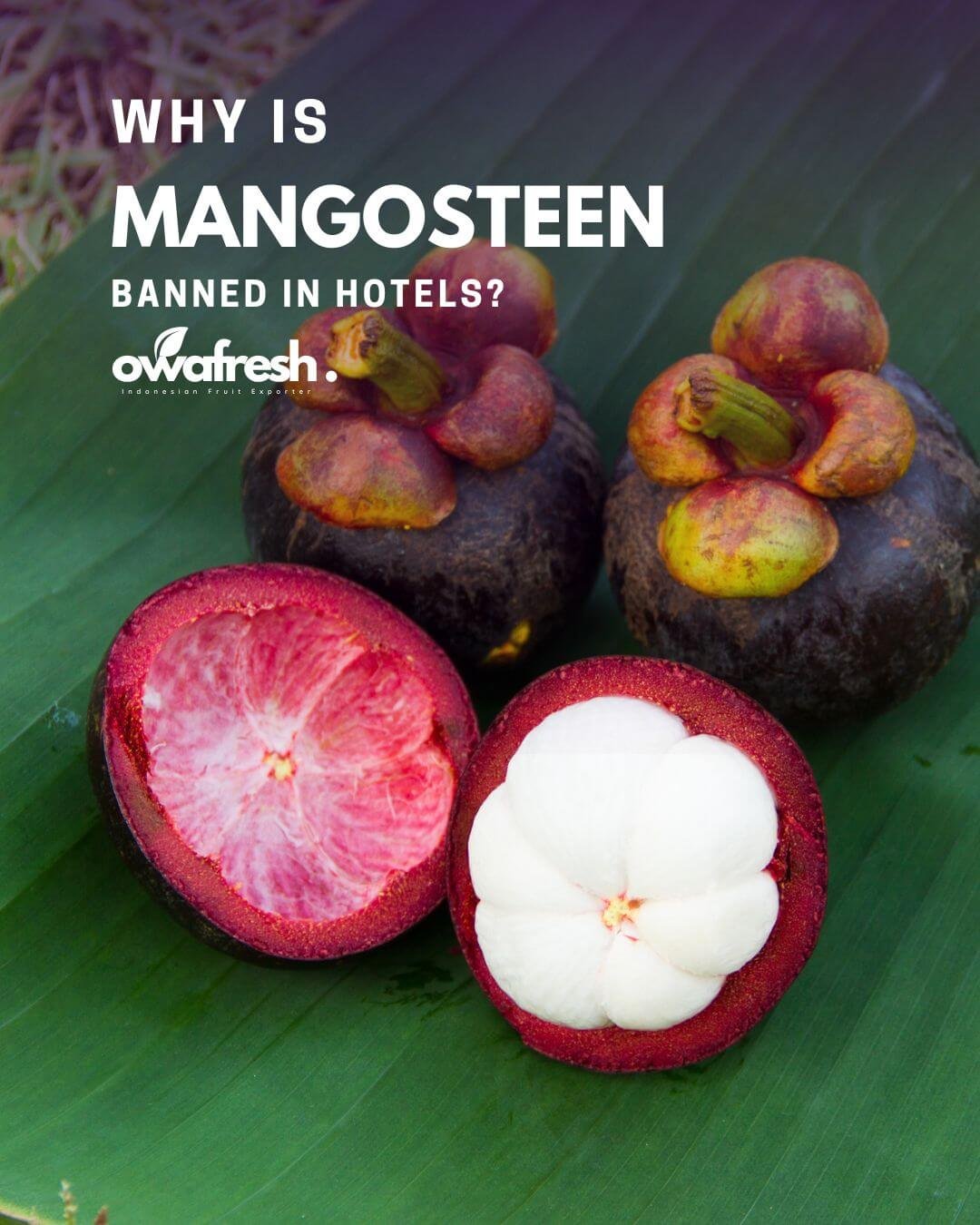
Mangosteen is widely celebrated as one of the sweetest tropical fruits, often called the Queen of Fruits. Visitors traveling through Southeast Asia often look for it in local markets and roadside stalls.
Yet, many tourists are surprised to find signs in hotels that forbid guests from bringing mangosteen into their rooms. This unexpected rule has made people search for answers to “why is mangosteen banned in hotels?” and why mangosteen is not allowed in hotel areas.
The Surprising Ban: Why Some Hotels Restrict Mangosteen
Most guests think restrictions like these must be about the fruit’s smell or safety, but that is not the real issue. Unlike durian, which is banned for its strong odor, mangosteen is banned in many hotels for a very different reason.
a. Staining Purple Rinds
The thick purple rind of mangosteen holds a juice that stains easily. Once the fruit is opened, the purple sap can drip onto bed sheets, walls, carpets, or even curtains. The pigment is strong and seeps into fabric, leaving behind dark marks that normal laundry methods often cannot remove.
b. Hard to Clean
Many hotel staff struggle to get rid of stubborn mangosteen stains. Removing them often needs special cleaning supplies or professional services, which adds extra cost for hotels. A stained room also risks upsetting future guests who expect spotless sheets and furniture.
Why Is Mangosteen Banned in Hotels: Common Cases
Travelers who love trying local fruits are often puzzled when they see a ban on mangosteen alongside durian. While durian’s smell can linger for hours, mangosteen’s threat is hidden in its colorful rind.
a. Rules in Southeast Asia
Across parts of Thailand, Malaysia, and Indonesia, some hotels place clear signs or notices telling guests to keep mangosteen outside guest rooms. In certain cities, staff will even check bags at the lobby to make sure guests do not bring in fruits that could cause cleaning troubles later.
b. Misunderstood by Tourists
First-time visitors often search why mangosteen is not allowed in hotels because the rule sounds unusual for such a sweet fruit. Many are surprised to learn it is purely about housekeeping and keeping rooms in perfect condition for the next guest.
Can Guests Still Enjoy Mangosteen While Traveling
The ban does not mean travelers have to skip tasting fresh mangosteen. Many hotels find ways to help visitors enjoy the fruit without causing messy problems indoors.
a. Eat Outside or in the Garden Area
Some hotels provide special garden spaces or open-air patios where guests can eat tropical fruits freely. This keeps juice and rinds far away from white linens and soft furnishings.
b. Buy Pre-Peeled or Packed
Local vendors in tourist spots sometimes offer mangosteen pre-peeled and packed in clean containers. This makes it easier to enjoy the sweet segments without risking any stains. Many travelers find this option more practical when bringing fruit back to their rooms.
The Bigger Story: Why Mangosteen Remains a Top Export
Although the hotel ban might sound odd, mangosteen remains in high demand among global buyers. The staining rind has no effect on its popularity in the fruit trade. Importers worldwide see mangosteen as a valuable tropical product that attracts shoppers looking for something special.
a. High Demand from Buyers
Countries like China, the UAE, and many European markets look for mangosteen each season. Fresh mangosteen is sold in high-end grocery stores, restaurants and specialty shops. Its sweet flavor and health benefits help maintain strong demand year after year.
b. Mangosteen from Indonesia
Indonesia plays a key role as one of the largest suppliers of fresh mangosteen. With ideal tropical conditions and long harvest periods, the country supports global shipments for months each year. Mangosteen Indonesia has built a solid reputation for quality fruit and reliable export processes.
c. Work with a Trusted Mangosteen Supplier
Choosing the right mangosteen supplier makes a big difference for buyers who want steady deliveries and top quality. OwaFresh works closely with growers and ensures each shipment is packed to meet international standards, no matter where the fruit is headed.
Conclusion
The next time someone wonders why mangosteen is banned in hotels, the answer is simple. It is not the taste or smell but the stubborn purple stains that make hotel owners cautious.
Despite this small challenge, mangosteen keeps its spot as a prized fruit with big export value. For importers looking for fresh supply from trusted farms, OwaFresh offers quality mangosteen ready to ship to markets worldwide.
Read also: Mangosteen Season in Thailand vs Indonesia and Can You Get Mangosteen in the US? How to Import


